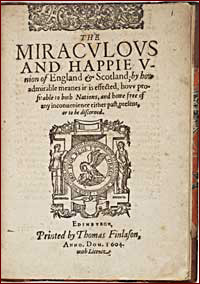Consequences of union

'The miraculous and happie union' (1604), one of the many books produced in support of the Union of the Crowns.
If James not been available to become King of England, it seems highly likely that England and Scotland would have continued their separate development into modern nation-states.
Indeed, after his death in 1625, the union started to fall apart. James never visited Ireland, Wales, the Highlands or islands of Scotland, and the 'British Isles' never became culturally united as he had hoped.
War, rebellion and 1707
In fact, the removal of the Scottish king from his country was a major cause of the 17th-century civil wars, in which Scotland rebelled against King Charles I. James's union gave England a royal family it distrusted and left Scotland without the key symbol of national independence.
At the end of the 17th century, the House of Stuart was expelled from Britain, and despite the various Jacobite attempts, never restored. As a result, the Union of the English and Scottish Parliaments was accomplished in 1707 against the wishes of James's descendants. James certainly did not expect his union to turn out like this.
Scotland today
Four hundred years after the Union of the Crowns, devolution has reversed some of the effects of 1707, but Scotland and England still share a monarch and have London as the Government's centre of power.
If James were to return to Edinburgh in the 21st century, there is much he would recognise – both parts of the skyline and aspects of the culture and politics of a country that has many of the qualities of nationhood, but which lacks full independence.


